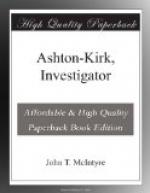He drew back the blind and looked at the side nearest the window. At the top of the faded space was a heavy dark line.
“I’ll modify that last statement,” said he, with satisfaction. “I’ll go as far as to say, now, that the blind has never been drawn since it was put up. This thick line marks the part that lay across the top of the roller, and the dust seems never to have been disturbed.”
The gas was lighted once more.
“Hume did not draw that curtain,” said Ashton-Kirk, decidedly. “He was too careless a man, apparently, to think of such a thing. The intruders, whoever they were, did it; they had a light, perhaps, and did not want to be—”
He paused abruptly here, and Pendleton heard him draw his breath sharply between his teeth; his eyes were fixed upon the lowermost step of the flight that led to the floor above.
One of the gas branches hung here; its full glare was thrown downward. Following the fixed gaze of his friend, Pendleton saw two partly burned matches, the stump of a candle, and some traces of tallow which had fallen from the latter upon the step. To Pendleton’s amazement, his friend dropped to his knees before these as a heathen would before an idol. With the utmost attention he examined them and the step upon which they lay. Then he arose, enthusiasm upon his face.
“Beautiful!” he cried. “I do not recall ever having seen anything just like it!” He slapped Pendleton upon the back with a heavy, hand. “Pen, that stump of candle sheds more light than the finest arc lamp ever manufactured.”
“I’m watching and I’m listening,” spoke Pendleton. “Also I’m agitating my small portion of gray matter. But inspiration, it seems, is not for me. So I’ll have to ask you what these things tell you.”
“Well, they give me a fairly good view of the man who, while he may not actually have murdered Hume, had much to do with his taking off.” He bent over the lower step once more, then looked up with a smile upon his face. “What would you say,” asked he, “if I told you that I draw from these things that the gentleman was short, well-dressed, near-sighted and knew something of the modern German dramatists.”
“I should say,” replied Pendleton, firmly, “that you ought to have your brain looked at. It sounds wrong to me.”
Ashton-Kirk laughed, and started up the stairs toward the third floor.
“I’ll return in a moment,” he said. “Don’t trouble to come up.”
He was gone but a very little while, and when he returned his face wore a satisfied look.
“The bolt of the scuttle is broken, just as Osborne said,” he reported. “And anyone who could gain the roof would have little difficulty in effecting an entrance.” He led the way down the hall, saying as he went: “Now we’ll browse around in the rooms for a while; then we’ll be off to dinner.”




